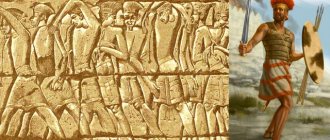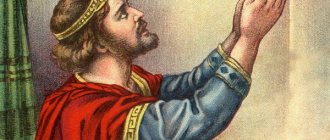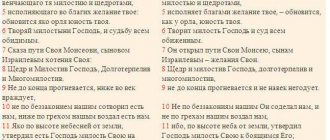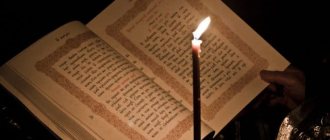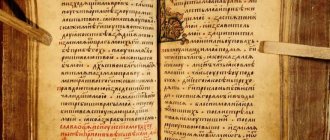Text of prayer Psalm 66
At the present stage, there are two translations from Hebrew. The first is a classic for the Orthodox Church and is written in Church Slavonic. This prayer is read mainly in churches. The second option is adapted to the Russian language and gives a better understanding of the meaning.
In Church Slavonic
In Russian
We read the Psalter. Psalm 66
Audio |
Conversation with Archpriest Alexy Ladygin about the Psalter.
We continue to study the Psalter and today we will talk about the 66th Psalm. The 66th Psalm has the following prescriptive writing: at the end, in songs, a psalm of songs to David, 66. The Psalm speaks of the Coming of Christ the Savior to earth. In it, the psalmist David expresses not only the prophecy that Christ will come, but also a sincere desire that He would come to earth as soon as possible and show the path that every faithful person who glorifies the Lord should follow.
“God, be gracious to us and bless us, make Your face shine upon us and have mercy on us.” That is: Lord, have mercy on us, people who have been tormented by the devil for so many years and do not know where to go, and bless us, give us the opportunity to glorify You, show us Your Face, Lord, and have mercy on us. Here is the clear call of the psalmist for the Lord to come to earth and reveal His Face and the mystery of God’s worship and the mystery of the Incarnation.
These words reveal the deepest meaning: it is impossible to continue to live like this on earth, then you need to see the Face of God. But we know that it is impossible to see Him - the same psalmist David himself says, taking into account the words of Holy Scripture, that it is impossible to see God and not die, no one can look at the Face of God. But here he prophesies that a time will come when the Lord will reveal His Face to those who believe in Him through the Incarnation - He will take upon Himself human flesh. These words, it must be said, were traditional for the Jewish people, who always blessed people in the name of God and from the Face of God, so these words were very well known. Again, through this comes the knowledge of God the Father: He who has seen Me has seen the Father; how do you say, show us the Father? He who has seen the Son has also seen the Father; He who knows the Son also knows about the Father.
“Let Thy way be known on earth; Thy salvation is on all nations.” “I am the way,” says the Lord: through the Lord Jesus Christ we come to the Father, we come to eternity. The Lord did not keep us in the dark about how and where we should go, what kind of compass we would have that would show this path. The Lord Himself came to earth, took on human form in order to walk this path and show which way we should go to the Lord. And the Lord did this in the most amazing way. He showed how we should live, what things we should do, what to beware of, how to treat our loved ones, what spiritual values to acquire in our lives.
The Lord was not separated from the difficulties and problems of earthly life; He showed that we should not become attached to anything in this life, that sorrows, suffering, and trials have become the lot of human life here on earth. The Lord Himself suffered, experienced the difficulties that you and I experience: hunger, thirst, and need, worried about the difficulties of those whom he loved, experienced illness, death. But with His Divine power He could correct the crookedness in the lives of His loved ones, thereby showing that if we are friends of the Lord, we too can join His great mercy, and He will bless us not only with words, but also prove everything with His wonderful deeds that to this day amaze a believer who turns to Him for help and receives both help and healing from the Lord.
The Lord walked the path of earthly life, showing suffering. We do not even physically touch the suffering He endured. But the Lord said: “Everything that happens, accept it, for I accepted it. It will happen in your life too. With your patience save your souls; he who endures to the end will be saved.” The Lord reached the very Cross, and while He was on the Cross, everyone tempted Him. There were difficult moments in which the Lord said: “My God, God, where have you forsaken Me?” But the power of the Lord Himself was always revealed. The Lord endured everything to the end, thereby showing that everyone who follows Him will see eternity. It is no coincidence that the Lord ascended to Heaven: not in order to simply sit at the right hand of God the Father, but in order to prepare His abode for everyone who believes in Him: “In My Father’s house are many mansions.” Therefore, here the psalmist David asks that the Lord show His Face, reveal Himself to the whole world, and through this make it possible to know on earth the path along which those who believe in Him should go to God.
“Thy salvation is in all nations.” It says here that this path is opened not only for the Jewish people, but for all the peoples of the earth. The Lord invites everyone to follow this path, and whoever does not refuse to follow it will find eternity and salvation.
“Let people confess to You, O God, let all people confess to You” - all people, including those from among the Jews, will confess You and glorify You, O Lord. Here the psalmist David repeats twice: “Let all people confess to You, O God,” and then: “Let all people confess to You,” separating, of course, the chosen people from other nations. The psalmist David nevertheless shows that not only the Jewish people will know the Lord and follow the Lord, but the people of the whole earth.
“Let the nations be glad and rejoice: for thou hast judged men with righteousness, and taught the tongues of the earth. Let people confess to You, O God, let all people confess to You.” The psalmist says very well, as if repeating himself: let people confess to You that they will all give thanks to the Lord. What will they thank You for, Lord? You judge everyone with truth: you punish sinners, have mercy on the virtuous, and accept repentance from people. It says here that the Lord does not look at the face, but looks at the deeds that a person does. “Let all people confess to You,” - let all people thank You, God, for the ineffable mercy that You give us: You approach everyone in righteousness; truth and mercy are always with You.
When a people gives thanks to God, then their life becomes peaceful, then everything becomes good in their life. And then the earth relates to man differently. After all, we know that natural phenomena happen for a reason: they are given for the sins that people carry within themselves. The Lord only blesses the good path of the righteous, but sends all sorts of punishments and trials to the sinful person. He gives the righteous the opportunity to create on earth, blesses this earth when a person lives with Him and strives to fulfill His commandments.
Therefore, further the psalmist David says: “The earth has given its fruit: bless us, O God, our God” - when you thank God for His great unceasing benefits, the Lord blesses the earth, it gives abundant fruit, and a person lives in abundance, without experiencing difficulties. And here it is surprising: if the Lord does not bless the land, the land will not bear fruit; If the Lord does not bless the builder, then the builder labors in vain - nothing will be created in life, nothing will be built if there is no God's blessing. And no matter how much someone wants to build a life without God (“we are ours, we will build a new world, we will destroy it to the ground”), he will be left with nothing: the one who thinks so and wants to build something in this life without God suffers failure , everything is not going well for him. And if a person lives with God, the Lord gives him everything, and the earth gives fruit, despite the vicissitudes and difficulties that a person encounters in his life.
The psalmist further prophesies about the Holy Trinity:
“Bless us, O God, our God, bless us, O God,” repeating three times: “God, God, God.” So he foresees that the image of the Holy Trinity will be revealed - the Father, the Son and the Holy Spirit, the Trinity Consubstantial and Indivisible. He will continue to talk about this. The appearance of the Trinity is so amazing because man came to know God in all its fullness. We also have such holidays as Epiphany, the holiday of the Trinity (we call Pentecost, the descent of the Holy Spirit), because on these days the Trinity, our God, appeared in all His fullness. And this, again, is no coincidence: both the holy fathers, and the psalmist David, and the forefathers already foresaw the image of the Holy Trinity, in a way that, perhaps, was hidden for them until time. And here the psalmist prophesies that the time will come when a person will know God in all its fullness - the Trinity will appear to him, and he will receive a blessing from the Lord Himself.
“And let all the ends of the earth fear Him.” Here the psalmist speaks in the singular (they will fear Him), emphasizing that the Trinity is Consubstantial and Indivisible. “All the ends of the earth will fear Him” - observance of the laws of God is necessary. To be afraid means to fulfill everything that the Lord commanded. He who fulfills the commandments of God receives a blessing from the Lord. Therefore, here he calls for everyone to strive to fulfill the commandments of the Lord, and then he will receive a blessing from the Holy Trinity: this is fear not for the sake of fear, but the fear of losing the love of God.
This psalm is so amazing! He testifies to what depth the psalmist penetrated: he penetrated into the depths of the New Testament, revealing such secrets that the Lord Himself would later speak about, and through Him would be revealed to the entire human race.
“God, have mercy on us and bless us, enlighten your face on us and have mercy on us,” we hear these words very often during divine services, like the exclamation of a priest, where he asks the Lord to have mercy and give consolation to a person after the enemy of the race He is tormented by the human: we say that we live in New Testament times, but we experience many internal difficulties. This cry is very important for each of us, so that our lives are not hidden behind the scenes, so that we communicate with God, so that the mercy that was given by the Lord during His Coming extends to each of us. But it will spread only when we have the deepest faith in our Lord, when you and I can see the Face of God Himself, see Him. It is very important. Why is this exclamation heard at every service in our churches, whether during the hours, in the evening, or in the morning: “God, be gracious to us and bless us, enlighten Your face on us and have mercy on us. Let us, Lord, see Your face.”
Although we know a lot about God, we sometimes do not see the Lord. We forget that the Lord is on this earth, so we begin to lead our lives not as the Lord commanded us, but in the way our earthly life is built. And it, and especially the modern one, is arranged without God: everything is in our life, and in great abundance, but among all this we do not find a place for God. So this cry of the psalmist still sounds urgent today: so that we break out of the bustle of our lives, seek the Face of God in order to walk the right path.
Life is not given so that we can taste the bread. As Saint Demetrius of Rostov said, we live and serve not for the sake of bread, but for the sake of our Lord Jesus. The life of every person should be aimed at ensuring that we see God and walk in the path of the Lord.
Again, why follow the path of the Lord? After all, you can live without God, and many live without God in this life, and, it would seem, they live happily, richly, and sufficiently. But this is only an external manifestation, as if these people are self-sufficient.
Life without God is the most terrible. A person who does not see God does not see the light, does not see any enlightenment in his life. A person who lives without God goes nowhere. It’s not that he rejects eternity - somewhere in his consciousness he may perceive it, but it will move away from him, because it is impossible for an unprepared person to enter there; he needs to prepare for it: a person will enter eternity only in wedding clothes. The wedding garment is a virtuous life with the Lord.
Some say: they say, we will live to old age and then we will go to the temple of God, we will begin to lead a different life, which the Lord commanded us. But not everyone lives to old age and will be able, when infirmities already set in, to spend their life in such a way as to prepare themselves for eternity.
A person who lives without God and who does not seek the Face of God does not receive blessings in his labors, very often remains dissatisfied both from work and from relationships in the family, and does not receive joy from his life. The Divine image is not visible in the faces of people: if we look at the faces of townspeople, especially in a big city, even in the morning, when a person gets up from sleep, not yet depressed, not tired, he already walks with a sad face, he has no smile, no joy on the face. Why? He lives without God, he cannot shine, because only the Lord gives light. There is no joy, because life without God gives so many difficulties and trials that a person cannot rejoice.
The one who lives with God can rejoice - then he sees the results of his labors: “The earth will give its fruit” - this is what the psalmist David says in this psalm. That is, when a person thanks the Lord, glorifies Him, then the earth gives fruit, then the days of his life become joyful for him, everything works out for him, work brings comfort, relationships with loved ones are leveled out, things go well. And a person gets up in the morning joyful; Having prayed, he feels that the Lord will bless him today.
Why should we enjoy every day? Every day gives us life. “This day, which the Lord has made, we will rejoice and be glad in it,” says the psalmist. Every day is created by God for man, and on this day a person must do a lot of good, positive, or, as we say, good deeds, then he will be filled with joy. And if we live only for ourselves, such a day will not bring us joy, we will not receive blessings from the Lord, and our life will not bring us comfort.
These are the amazing words the psalmist David speaks and calls on us, so that, as we follow the Lord, we make our paths straight, according to the word of the Holy Scripture, that is, we always strive to do the will of God. And the will of God is that we fulfill that law and those commandments that the Lord left. These are not only the ten commandments, this is the totality of good deeds that we must do, according to the word of the Holy Scriptures. We must build our lives as the Lord said - we must measure our actions with the word of God and pass our thoughts through the prism of Holy Scripture, even in the modern world, which tells us that we must act differently, that Christianity is outdated, now new ones are appearing values, and we must follow these new values, new law, new relationships, new standards and so on...
For us, one standard is the Holy Scripture, we must listen to the Holy Scripture, and as the Lord spoke, as He taught us throughout His entire life, so we must do. This is what is called “to know Your way on earth; Your salvation is on all nations.” Then there will be salvation for all the people when we come to know the way of our Lord and follow Him.
And not to be upset that sometimes something doesn’t work out for us, not to be sad, but to bring repentance to God and meekly endure the trials that He sends to us for our correction, purification, admonition and so that we become more and more strengthened in a virtuous life.
To receive God’s blessing means to establish one’s homes: to strengthen one’s family—every person should strive for this. It is precisely this deepest meaning that the psalmist David puts into the lines of the Holy Scripture; he speaks of the truth and righteousness of the Lord, who clearly rewards everyone according to their righteousness, but also shows His mercy.
This psalm showed us what we should strive for, what we should start from in our lives, what to do, and what to move away from and what not to touch. With gratitude to the Lord, with gratitude to the psalmist David for the depth that he reveals to us through the lines of the Psalter.
Brothers and sisters, when we meaningfully approach the reading of the Psalter, then we will receive great consolation from contact with those lines, with those prophecies that the psalmist David left us.
I sincerely thank you for the time we spent together today! I invoke God’s blessing on all of you, and see you again!
Recorded by Nina Kirsanova
